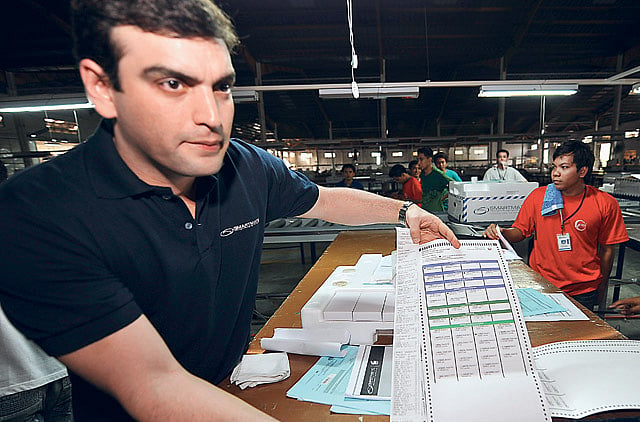Arroyo, Comelec lose sleep over new date for stalled elections
10,000 of 82,000 counting machines malfunction during initial test

Manila: President Gloria Arroyo and the government's election body were divided over the date of the automated polls after 10,000 of the 82,000 counting machines malfunctioned during initial test, senior officials said.
"Under the present situation, a 15-day postponement would be reasonable to give time for the Commission on Elections (Comelec) to print additional forms for manual tally and canvass," lawyer Romulo Macalintal said.
The Omnibus Election Code allows Comelec to reset the polls "based on serious cause like the apparent failure of the precinct count optical scan (PCOS) machines to properly and correctly function," Macalintal said.
Comelec has the power to allow manual counting of votes in case of machine error, Macalintal said.
Arroyo's promise
Earlier, Arroyo's spokesperson Gary Olivar said the president was after successful automated elections, whether it is delayed or not on May 10, adding, "It was one of the promises that she gave to the people since the start of her term."
To delay the May 10 polls would "not be an unreasonable judgement," Olivar said, as long as this was meant to perfect the country's first automated elections.
Arroyo has asked Commissioner Ray Anthony Chua of the Commission on Information and Communications Technology (CICT) to meet with Comelec officials and members of Smartmatic-TIM, a private contractor, to arrive at "alternative solution" to the embarrassing problem of malfunctioned vote-reading machines.
Smartmatic-TIM which bagged a P7.2 billion (Dh600 million) contract for the automated elections was criticised for giving machines that could read blank paper ballots and could not record full ballots. They also reversed votes of rivals.
Smartmatic-TIM traced the machine error to incorrectly configured memory cards. Comelec believed the private vendor could solve the technical problem ahead of the May 10 polls.
Polls on time
"The elections will push through on May 10. [What happened] was a major logistic problem, but it can be solved with the reconfiguration of the memory cards. We now have to write (the codes) into the cards, bring them to the provinces and then swap them with the old ones, test and seal them again," Comelec Commissioner Gregorio Larrazabal, said.
Manual counting of votes could be the answer to Comelec's plan to hold the May 10 polls on time, despite the technical problem it has encountered, several groups said.
Comelec should now prepare for a manual count of votes, if it does not want to delay the holding of the polls on May 10. The change of plan is "mandated by law," Liberal Party standard-bearer Sen. Benigno Aquino said.
Manual copies
To do that, Comelec must now print complete sets of election forms, as it was done in the past, four influential groups such as the Financial Executives Institute of the Philippines, Makati Business Club, Management Association of the Philippines, and the Philippine Bar Association, said.
This would salvage Comelec's credibility and allow its plan to hold the May 10 polls as scheduled, they added. Parallel manual and automated counting of votes is expensive. Comelec might spend P10 billion (Dh 833.3 million) for the May 10 polls, if the plan pushes through, Rogelio Peyuan, Arroyo's spokesman, said.
A breakdown in the peaceful transition of leaders could allow the military loyal to Arroyo to re-install her in power beyond the end of her term on June 30, critics said, adding that failure of elections could be a prelude to this scenario.
Manila The presence of observers is expected to lend confidence to Monday's elections, the results of an independent pre-election survey revealed.
A special pre-election poll conducted by pollster Social Weather Stations (SWS) from February 24-28, found that while only 47 per cent of Filipino voters are aware that there will be independent observers in the May 10 elections, "most registered voters appreciate their roles in the coming elections, with 74 per cent saying their presence adds confidence that the elections would be clean and honest."
Those polled said the presence of independent observers will help deter election-related violence — a major concern in remote areas of the country where armed partisan aggression is commonplace during elections.
Awareness of election observers in the May 2010 elections is higher among the middle-to-upper classes and the more educated.
Sign up for the Daily Briefing
Get the latest news and updates straight to your inbox
Network Links
GN StoreDownload our app
© Al Nisr Publishing LLC 2025. All rights reserved.